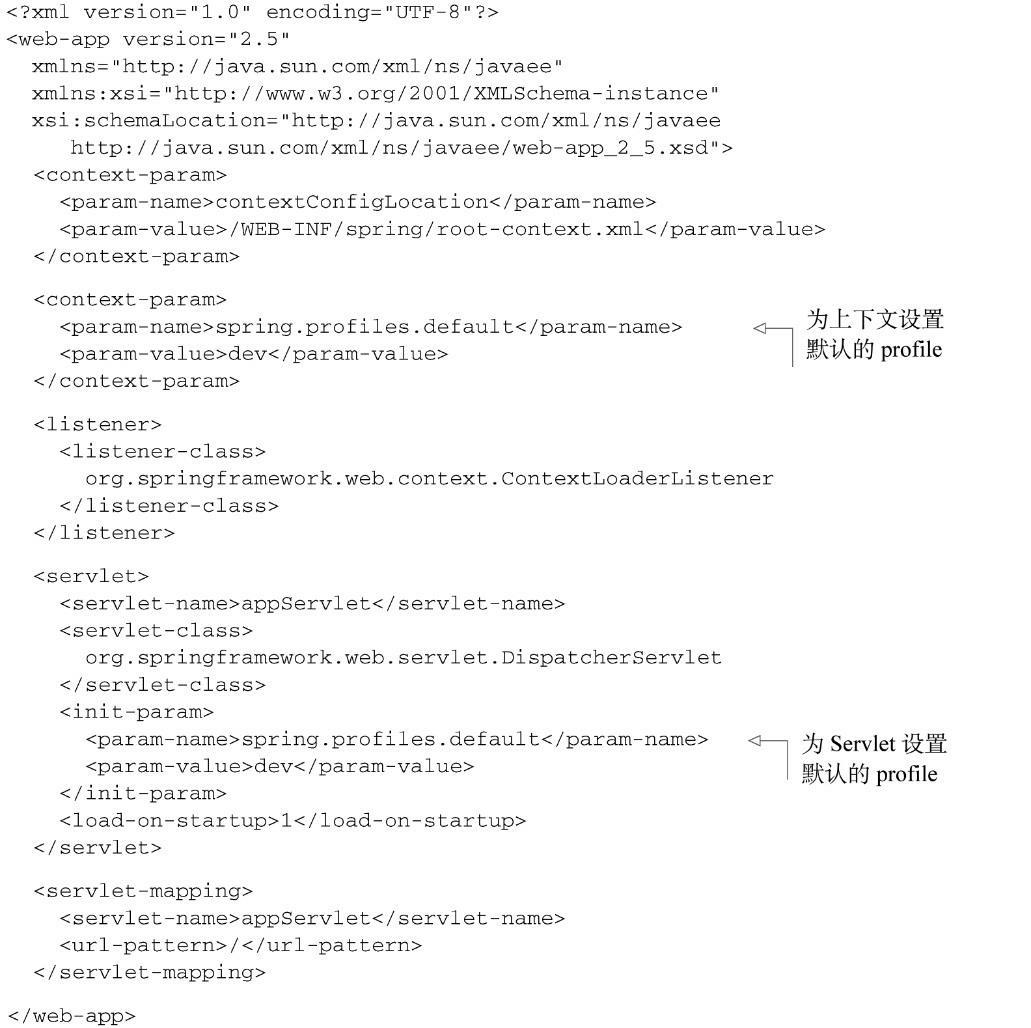SpringInAction-- 配置Profile Bean
Posted 圆圆的园园
tags:
篇首语:本文由小常识网(cha138.com)小编为大家整理,主要介绍了SpringInAction-- 配置Profile Bean相关的知识,希望对你有一定的参考价值。
Profile Bean 使用场景描述:
在开发软件的时候,在数据库方面,往往不是一个库就能解决的,一般分为开发库、测试库、生产库,在这些库设置链接的时候,也会配置其对应的数据。
现有一种方式,就是单独的配置类,或者在xml中配置bean,然后在构建的时候确定哪一个配置编译到部署的应用。这种方式是可行的,但是也是有问题存在的,即当从开发阶段迁移到QA阶段的时候,重新部署是没有问题的,但是从QA阶段迁移到生产阶段的时候,重建有可能会引入bug并且会使得QA团队成员中带来不安的情绪。
这个时候我们就可以引入profile了
profile bean的好处
Spring提供的profile bean 配置,其原理是根上面的解决方式没啥区别,两种方法的区别就是在于spirng在运行的时候,会根据环境决定哪些bean应该被创建,哪些不被创建。因为不是在部署前去判断的,而是等运行的时候来判断的,这样一来,一个部署单元(可能是war包)就能够适合所有的环境,这样一来就没有必要重构了。
接下里就让我们从例子中来领会它的含义
假设我们有三种坐骑,当我们在陆地的时候可以选择 跳跳蛙、在天空的时候选择小黑龙、在海洋中的时候选择 皮皮虾。。
这样一来我们先创造一个 宠物坐骑接口类 PetMounts 然后分别创造自己的坐骑。 FlyingMounts 、LandMounts 、SeaMounts
PeTMounts
package com.bean.profile;
/**
* Created by IntelliJ IDEA.
* Author XueYuan
* Data 2017/02/22
* Time 16:46
*/
public interface PetMounts {
void letsGo();
}
FlyingMounts
package com.bean.profile; /** * Created by IntelliJ IDEA. * Author XueYuan * Data 2017/02/22 * Time 16:52 */ public class FlyingMounts implements PetMounts { public void letsGo() { System.out.println("我是飞行坐骑 小黑龙,我们走……!"); } }
LandMounts
package com.bean.profile; /** * Created by IntelliJ IDEA. * Author XueYuan * Data 2017/02/22 * Time 16:53 */ public class LandMounts implements PetMounts { public void letsGo() { System.out.println("我是陆地坐骑 跳跳蛙,我们走……!"); } }
SeaMounts
package com.bean.profile; import org.springframework.stereotype.Component; /** * Created by IntelliJ IDEA. * Author XueYuan * Data 2017/02/22 * Time 16:54 */ @Component public class SeaMounts implements PetMounts { public void letsGo() { System.out.println("我是海洋坐骑 皮皮虾,我们走……!"); } }
好了坐骑我们创造好了,下面就开始根据环境来选择什么坐骑。
首先先来看 java文件的配置方法
package com.bean.profile; import org.springframework.context.annotation.Bean; import org.springframework.context.annotation.Configuration; import org.springframework.context.annotation.Profile; /** * Created by IntelliJ IDEA. * Author XueYuan * Data 2017/02/22 * Time 16:44 */ @Configuration public class PetMountsConfig { @Bean @Profile("sky") public PetMounts sky() { return new FlyingMounts(); } @Bean @Profile("land") public PetMounts land() { return new LandMounts(); } @Bean @Profile("sea") public PetMounts sea() { return new SeaMounts(); } }
我们要分别创建Bean 然后在对应的方法上面添加profile
小贴士:在Spring3.1之前只能在类级别上面添加@Profile注解;从Spring3.2后开始就支持在方法上面添加注释
xml中配置Profile
<?xml version="1.0" encoding="UTF-8"?> <beans xmlns="http://www.springframework.org/schema/beans" xmlns:xsi="http://www.w3.org/2001/XMLSchema-instance" xsi:schemaLocation="http://www.springframework.org/schema/beans http://www.springframework.org/schema/beans/spring-beans.xsd"> <beans profile="sky"> <bean id="flyingMounts" class="com.bean.profile.FlyingMounts"/> </beans> <beans profile="land"> <bean id="landMounts" class="com.bean.profile.LandMounts"/> </beans> <beans profile="sea"> <bean id="seaMounts" class="com.bean.profile.SeaMounts"/> </beans> </beans>
在xml中配置,主要是利<beans>中的Profile 属性
好了配置也配置好了,那么下面要怎么用,怎么激活呢?
Spring在确定哪个profile处于激活状态时,需要依赖两个独立的属性:spring.profiles.active和spring.profiles.default。如果设置了spring.profiles.active属性的话,那么它的值就会用来确定哪个profile是激活的。但如果没有设置spring.profiles.active属性的话,那Spring将会查找spring.profiles.default的值。如果spring.profiles.active和spring.profiles.default均没有设置的话,那就没有激活的profile,因此只会创建那些没有定义在profile中的bean。
有多种方式来设置这两个属性:
- 作为DispatcherServlet的初始化参数;
- 作为Web应用的上下文参数;
- 作为JNDI条目;
- 作为环境变量;
- 作为JVM的系统属性;
- 在集成测试类上,使用@ActiveProfiles注解设置。
下面就是在web中配置 profile (偷懒了下 直接书上的图片)

在测试中使用Profile的时候 方法如下:
@RunWith(SpringJUnit4ClassRunner.class) /*@ContextConfiguration(classes = PetMountsConfig.class)*/ @ContextConfiguration(value = "config.xml") @ActiveProfiles("sea") public class LetsGo { …… }
激活方法我们也知道了,现在就让我们选择一个坐骑,去把妹吧!
package com.bean.profile; import org.junit.Test; import org.junit.runner.RunWith; import org.springframework.beans.factory.annotation.Autowired; import org.springframework.test.context.ActiveProfiles; import org.springframework.test.context.ContextConfiguration; import org.springframework.test.context.junit4.SpringJUnit4ClassRunner; /** * Created by IntelliJ IDEA. * Author XueYuan * Data 2017/02/22 * Time 20:42 */ @RunWith(SpringJUnit4ClassRunner.class) /*@ContextConfiguration(classes = PetMountsConfig.class)*/ @ContextConfiguration(value = "config.xml") @ActiveProfiles("sea") public class LetsGo { @Autowired PetMounts petMounts; @Test public void LetsGoLog(){ petMounts.letsGo(); } }
以上就是peofile bean简单小例子,如有错误,请指出,谢谢~
代码:https://github.com/eoooxy/springinaction test下 的com.bean.profile中
以上是关于SpringInAction-- 配置Profile Bean的主要内容,如果未能解决你的问题,请参考以下文章